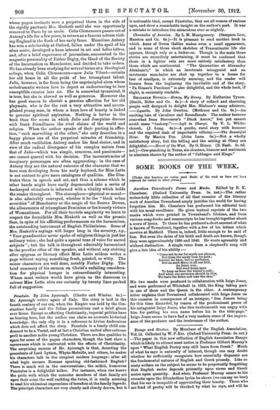1Paustula. By John Ayscough. (Chatto and Windus. 6s.)— Mr. Ayscough
writes again of Italy. His story is laid in the fourth century of our era, when the Empire was held by the Con- stantine family and the Julian persecutions cast a brief gloom over Rome. Except as affecting Christianity, imperial politics have no bearing here, but the author can claim an accurate historical knowledge : the only slip is in a reference to Livius Andronicus which does not affect the story. Fa-astula is a lonely child con- demned to be a Vestal, and at last a Christian united after extreme peril to another noble young Christian. There are fine qualities to spare for some of the pagan characters, though the best show a narrowness which is contrasted with the effects of Christianity. The surprising success of Mr. Ayscough is that, deserting the precedents of Lord Lytton, Whyte-Melville, and others, he makes his characters talk in the simplest modern language : after all what logic excuses Romans speaking old-fashioned English? There is much wit in the conversations; the selfish, humorous Faustulus is a delightful talker. For instance, when one knows the pride with which the consular members of that family set upon their coins the wolf suckling the twins, it is really amusing to read his whimsical expressions of boredom at the family legends. The principal characters are very clearly and closely drawn, but it
is noticeable that, except Faustrdus, they are all women of various ages, and show a remarkable insight on the author's part. It was a mistake to introduce the miraculous ever so slightly.
Chronicles of Avonlea. By L. M. Montgomery. (Sampson Low, Marston and Co. 6s.)—It is pleasant to read another book in which Anne of Green Gables makes even a small appearance, and in some of these short sketches of Transatlantic life she appears, though only as a looker-on. Though in the main these stories arc exceedinly entertaining, it must be confessed that those in a lighter vein are more entirely satisfactory than those which are sentimental. "The Quarantine at Alexander Abraham's," in which an inveterate misogynist and an inveterate man-hater are shut up together in a house for fear of smallpox, is extremely amusing, and the reader will foresee from the beginning the inevitable end of the story. "Pa Sloane's Purchase" is also delightful, and the whole book, if slight, is eminently readable.


















































 Previous page
Previous page